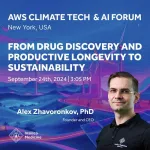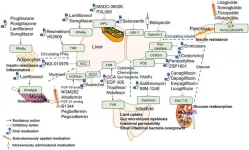(Press-News.org)
Held annually, NY Climate Week is a pivotal event in the global climate change calendar. Bringing together notable leaders, celebrities, climate professionals, and innovators from around the world, the event serves as a critical platform for discussing and advancing climate action. This year’s theme, "It’s Time," underscores the urgency for immediate and ambitious efforts to tackle climate change, and the process could be accelerated with Generative AI and other cutting-edge technologies.
Insilico Medicine (“insilico”), a leading company in AI-driven drug discovery, is proud to announce that our Founder and CEO, Alex Zhavoronkov, PhD, will be presenting at the AWS Climate Tech & AI Forum during NY Climate Week, where he shares insights on AI-driven sustainability efforts under the title “From drug discovery and productive longevity to sustainability” at 3:05 PM on September 24. The forum provided a unique platform to address the urgent need for innovative climate solutions.
The AWS Climate Tech & AI Forum focuses on topics including foundational models, sustainable material discovery, virtual agents and synthetic data, discussing the application generative AI and machine learning in product development, cost reduction, emission control and creating climate solutions that were previously unimaginable.
Even before the announcement of the Generative AI for Environmental Sustainability Consortium on the Insilico Medicine Generative Artificial Intelligence Action (IMGAIA) webinar in July 2024, Insilico has been exploring AI-powered sustainable development. Today, Insilico is actively venturing into agrochemistry, hydrogen storage, CO2 capture and other applications with the support of partners including Syngenta and Saudi Aramco.
In 2016, Insilico first described the concept of using generative AI for the design of novel molecules in a peer-reviewed journal, which laid the foundation for the commercially available Pharma.AI platform. Since then, Insilico keeps integrating technical breakthroughs into Pharma.AI platform, which is currently a generative AI-powered solution spanning across biology, chemistry and clinical development. Powered by Pharma.AI, Insilico has nominated 19 preclinical candidates in its comprehensive portfolio of over 30 assets since 2021 and has received IND approval for 9 molecules.
In early 2024, Insilico published a Nature Biotechnology paper presenting the entire R&D journey from AI algorithms to Phase II clinical trials of ISM001_055, the company’s lead drug pipeline with AI-discovered target and AI-designed structure. Following that, Insilico has recently announced positive preliminary results from a Phase IIa trial (NCT05938920), where ISM001_055 showed dose-dependent response in forced vital capacity (FVC), after only 12 weeks of dosage.
About Insilico Medicine
Insilico Medicine, a global clinical stage biotechnology company powered by generative AI, is connecting biology, chemistry and clinical trials analysis using next-generation AI systems. The company has developed AI platforms that utilize deep generative models, reinforcement learning, transformers and other modern machine learning techniques for novel target discovery and the generation of novel molecular structures with desired properties. Insilico Medicine is developing breakthrough solutions to discover and develop innovative drugs for cancer, fibrosis, immunity, central nervous system diseases, infectious diseases, autoimmune diseases, and aging-related diseases. www.insilico.com
END
Young adults who vape show chemical changes in their DNA similar to those found in young adults who smoke — changes known to be linked to the development of cancer — according to a new study just published in the American Journal of Respiratory Cell and Molecular Biology.
A team of researchers from the Keck School of Medicine of USC measured DNA methylation, a chemical modification of DNA that can effectively turn genes “on” or “off, in the oral cells of young adult vapers, smokers and non-users. DNA methylation is vital to normal cellular ...
DALLAS, Sept. 25, 2024 — The American Heart Association, celebrating 100 years of lifesaving service as the world’s leading nonprofit organization focused on heart and brain health for all, is joining with other top cardiovascular research funders around the world to support an international scientific research grant focused on women’s cardiovascular health. Scientific researchers around the world are invited to apply for the award to foster global advancements in understanding and improving the diagnosis, treatment and prevention of cardiovascular disease (CVD) among women.
A 2022 presidential advisory ...
Non-alcoholic fatty liver disease (NAFLD), recently reclassified as metabolic dysfunction-associated steatotic liver disease (MASLD), has become the most prevalent chronic liver disease globally. This reclassification underscores the metabolic dysfunction central to the disease, which spans a spectrum from simple steatosis to more severe forms like steatohepatitis, fibrosis, and cirrhosis. Given the significant overlap between MASLD and type 2 diabetes mellitus (T2DM), the therapeutic strategies for MASLD have increasingly focused on addressing metabolic derangements. Despite its global prevalence, no specific drugs have been approved for MASLD, highlighting an urgent need ...
September 25, 2024 (Washington, DC)—The Kissick Family Foundation Frontotemporal Dementia (FTD) Grant Program, in partnership with the Milken Institute Science Philanthropy Accelerator for Research and Collaboration (SPARC), today announced six research teams awarded two-year grants to advance scientific understanding of FTD, totaling $3 million in new funding for this disease.
This inaugural cycle of the Kissick Family Foundation FTD Grant Program represents a unique philanthropic strategy that specifically targets basic or early-stage translational research projects that focus on those disease cases ...
Metastatic cancer can be a devastating diagnosis. The cancer is spreading. It may travel to multiple organs in the body. This could mean more pain and ultimately, death.
Unfortunately, just how cancer spreads remains unclear. But now, Cold Spring Harbor Laboratory (CSHL) Professor Adam Siepel and colleagues have a way to better understand that process. New technology developed at Weill Cornell Medicine barcodes cells to track the highways by which prostate cancer spreads throughout the body.
The resulting roadmap shows that most cancer cells actually stay put within the tumor. However, ...
Augmented reality (AR) takes digital images and superimposes them onto real-world views. But AR is more than a new way to play video games; it could transform surgery and self-driving cars. To make the technology easier to integrate into common personal devices, researchers report in ACS Photonics how to combine two optical technologies into a single, high-resolution AR display. In an eyeglasses prototype, the researchers enhanced image quality with a computer algorithm that removed distortions.
AR systems, like those in bulky goggles and automobile head-up displays, require portable optical components. But shrinking the typical four-lens AR system to the size of eyeglasses or smaller ...
Professor Ron Boschma is the first Dutch person to receive the Prix Vautrin Lud, the highest academic award within the field of geography. The award will be presented in Saint-Dié-des-Vosges, France on 6 October. Prior to the award ceremony, Prof. Boschma will give an invited lecture at the Sorbonne University in Paris on 4 October. Boschma was nominated for the award in recognition of his scientific contributions to the field of economic geography, especially for laying the foundations of evolutionary economic geography and his research into regional diversification and innovation policy. The European Union’s regional policy is based in part on his ...
Research Highlights Risk to Both Humans and Wildlife, Suggests Need for New Collision Mitigation Strategies
A recent article published in PeerJ Life & Environment has uncovered insights into how mallards (Anas platyrhynchos) respond to approaching vehicles, revealing that these common waterbirds are poorly equipped to avoid collisions, particularly at high speeds. The research, which used both simulated and real-world vehicle approaches, highlights the urgent need for improved methods to reduce bird-vehicle collisions—events that are not only financially costly but also dangerous to both humans and wildlife.
The study focused ...
About The Study: In this randomized clinical trial, home-based phototherapy was as effective as office-based phototherapy for plaque or guttate psoriasis in everyday clinical practice and had less burden to patients.
Corresponding Author: To contact the corresponding author, Joel M. Gelfand, MD, email joel.gelfand@pennmedicine.upenn.edu.
To access the embargoed study: Visit our For The Media website at this link https://media.jamanetwork.com/
(doi:10.1001/jamadermatol.2024.3897)
Editor’s Note: Please see the article for additional information, including other authors, ...
Large expansion of carbon capture and storage is necessary to fulfill the Paris Climate Agreement. Yet a new study led by Chalmers University of Technology, in Sweden and University of Bergen, in Norway, shows that without major efforts, the technology will not expand fast enough to meet the 2°C target and even with major efforts it is unlikely to expand fast enough for the 1.5°C target.
The idea behind carbon capture and storage (CCS) technology is to capture carbon dioxide then store it deep underground. Some applications of CCS, such ...





